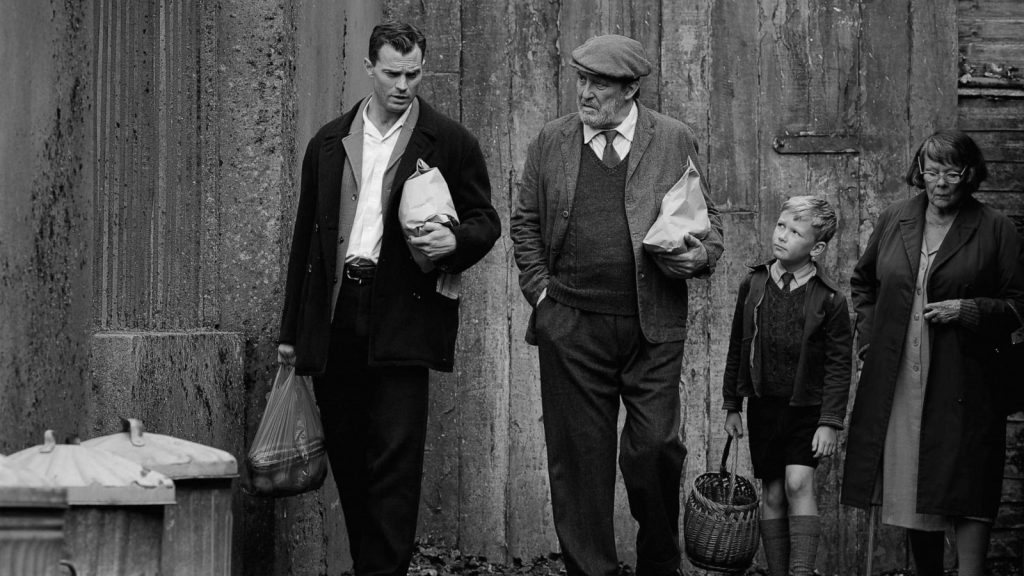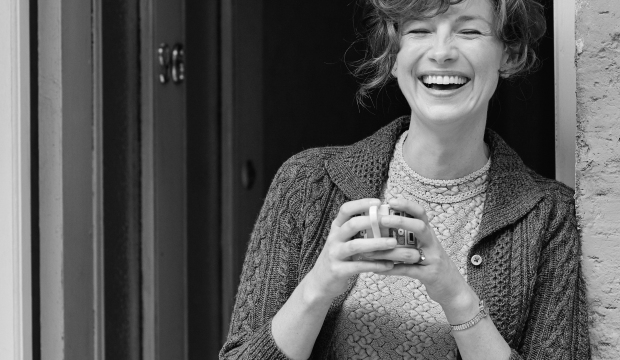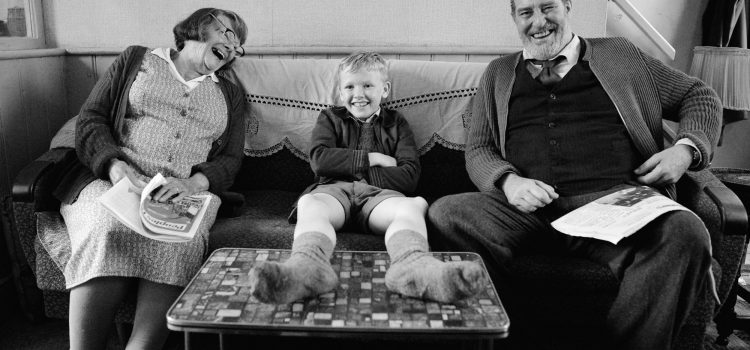By Alex McPherson
Accessible and brimming with directorial skill, Sir Kenneth Branagh’s future awards hopeful, “Belfast,” is an affecting coming-of-age story set amidst civil conflict.
Taking place during the summer of 1969 in Northern Ireland, “Belfast” functions as a cinematic memoir for Branagh — looking back at a seemingly idyllic stage in his life beset by the brutality of The Troubles between Protestants and Catholics. Buddy (a revelatory Jude Hill) is a boy nearing adolescence, possessing a wide-eyed curiosity and playfulness in his small, mostly Protestant neighborhood. He’s surrounded by his courageous mother (Catríona Balfe), his father (Jamie Dornan) who works in England, brother Will (Lewis McAskie), his rebellious older cousin Moira (Lara McDonnell), his lovably sardonic grandmother (Dame Judi Dench), and his grandfather (Ciarán Hinds), who remains Buddy’s primary confidant..
As destructive riots begin to take place within and around his community, Buddy (a Protestant) struggles to make sense of what’s happening, if one can even make sense of it to begin with. What matters most to him is having fun and attempting to build up the courage to talk to his school crush (a Catholic girl). The adult world creeping steadily upon his doorstep threatens to permanently influence the person he will become — forcing him to grow up as his parents debate whether or not to leave the only place they’ve called home.
“Belfast” could arguably be faulted for not painting a comprehensive picture of The Troubles, but Branagh’s film remains both uplifting and heartbreaking in equal measure. Seeing the story play out through Buddy’s eyes lends the proceedings a wistful edge, as we observe this young soul — full of life — navigate an increasingly perilous environment with loved ones by his side.

After an in-color introduction showcasing present-day Belfast, the film swiftly transitions to crisp black-and-white photography, evoking the sense of being transported back to an era both fantastical and menacing. The sequence that follows is one of 2021’s best. Buddy’s street devolves from safe and peaceful into utter chaos when a Protestant mob attempting to expunge any remaining Catholics from the neighborhood rounds the corner. The camera swirls around Buddy frozen in fear as the crowd approaches, and we’re launched into an intense situation not completely unlike a horror film. It’s reflective of Branagh’s fusion of tenderness and harsh reality that continues throughout, which makes each moment of grace between the characters all the more meaningful.
Composed largely of small conversations between Buddy and his family, “Belfast” gives the titular setting both a welcoming, lived-in feel, as well as the sense that unexpected violence could strike at any point. Indeed, thanks to the absolutely incredible cast and imaginative direction from Branagh, viewers can feel his passionate longing for those days gone by.
Even though the looming carnage casts a dark shadow over most scenes, there’s still plenty of humor to be found here, particularly in regard to Buddy’s heart-to-heart discussions with his grandma and grandpa about everything from the moon landing to how to woo girls to what to make of the outside world that’s seemingly falling apart.
Moments like these, given added texture through Hinds’ and Dench’s wise, knowing auras, pull at viewers’ heart strings and underline the fact that this resilient family can weather any obstacle if they stick together. Hill is a spectacular performer for someone 11 years old, conveying Buddy’s confusion, wonder, and eventual sadness in completely believable fashion.
The rest of the actors are just as excellent. Balfe is blindingly good as a beautiful, caring, deeply concerned parent who wants to protect her children and is strongly attached to her home base in Belfast. Dornan gives a rich performance as Buddy’s father, a man fiercely against viewing people in absolutes, who faces pressure from a radical acquaintance (Colin Morgan) to join a Protestant gang. The stressed couple fight over barely being able to pay rent and whether to move away, all while Buddy listens nearby, the sparkling glint in his eyes turning to tears.
Cinematographer Harris Zambarloukos does an admirable job depicting Buddy’s community as an interconnected unit teeming with energy where everyone knows each other, implementing tracking shots galore. Characters might be conversing quietly only to be interrupted by someone sitting in the corner of the frame, resembling a stage production. “Belfast” also reverts back to color photography when Buddy and company view a play or film together, likely emphasizing the profound impact that the arts had on Branagh as a child, but simultaneously feeling a bit on-the-nose.
With a soundtrack by Van Morrison accentuating moments of euphoria and tragedy among the characters, and a mournful, jazzy original score, “Belfast” depicts the city and Buddy’s family with a nostalgic glow tinged with sadness and regret. A few scenes feel too far separated from reality, and the film follows a relatively predictable framework, but the power of Branagh’s passion project is difficult to refute, and absolutely worth experiencing.

“Belfast” is a 2021 drama directed by Kenneth Branagh and starring Jude Hill, Caitriona Balfe, Jamie Dornan, Judi Dench, Ciaran Hinds Lewis McAskie, and Colin Morgan. Rated PG-13 for some violence and strong language and runs 1 hour, 38 minutes. Alex’s Grade: A-

Lynn (Zipfel) Venhaus has had a continuous byline in St. Louis metro region publications since 1978. She writes features and news for Belleville News-Democrat and contributes to St. Louis magazine and other publications.
She is a Rotten Tomatoes-approved film critic, currently reviews films for Webster-Kirkwood Times and KTRS Radio, covers entertainment for PopLifeSTL.com and co-hosts podcast PopLifeSTL.com…Presents.
She is a member of Critics Choice Association, where she serves on the women’s and marketing committees; Alliance of Women Film Journalists; and on the board of the St. Louis Film Critics Association. She is a founding and board member of the St. Louis Theater Circle.
She is retired from teaching journalism/media as an adjunct college instructor.

